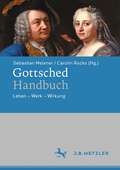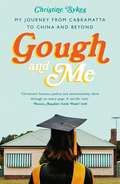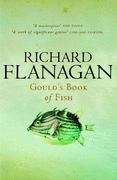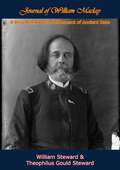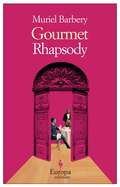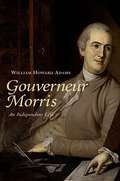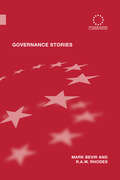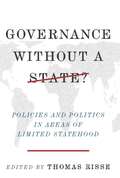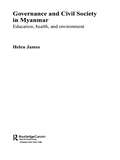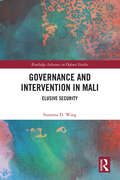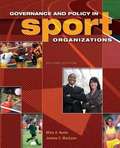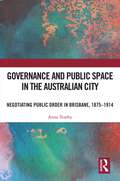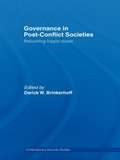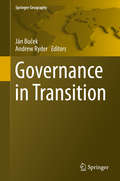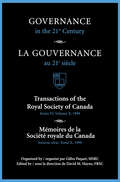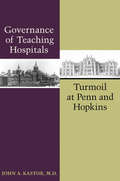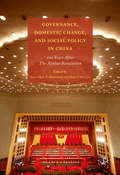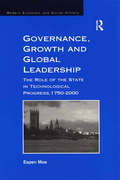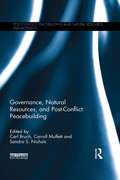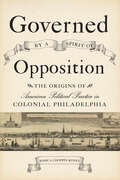- Table View
- List View
Gottlieb's Bakery: Savannah's Sweetest Tradition
by Richard Gottlieb Laurence Gottlieb Michael Gottlieb Isser GottliebIn 1884, in the basement of a building on the corner of York and Jefferson Streets, something miraculous was happening. Jewish Russian immigrant Isadore Gottlieb had built a bakery that would soon be renowned in Savannah for every tasty morsel pulled from its busy oven, creating the perfect combination of southern and Jewish delicacies. Goods were delivered to citizens and stores by cart, pulled by a horse that knew every stop along the way, cementing the bakery's reputation as a true neighborhood operation. From shiny, egg-brushed challah to Sister Sadie's hazelnut cake to the ever-popular chocolate chewies, customers would crowd the store for a single irresistible bite. Join the next generation of Gottliebs as they recount the heartwarming stories and recipes that forever preserve the bakery's place in Savannah's history.
Gottsched-Handbuch: Leben – Werk – Wirkung
by Giulia Morra Bend StrebelJohann Christoph Gottsched (1700–1766) ist eine zentrale Figur der europäischen Aufklärung. Das Handbuch stellt seine Arbeiten in den Bereichen der Poetik, Rhetorik, Philosophie und Sprachforschung dar. Die Poetik erschließt sich mit Blick auf Gattungsdifferenzierungen (Lyrik, Epik, Dramatik, Korrespondenz und Literaturkritik), hinsichtlich einschlägiger poetologischer Traditionslinien (Antike, Französischer Klassizismus, Barock) und in Kollaboration mit anderen Autor*innen, ganz besonders mit Luise Gottsched (1713–1762). Sein Œuvre, dessen Wirkungen und Rezeptionen werden dabei in der Spannung zwischen normpoetischem Anspruch, aufklärerischer Didaxe und proto-ästhetischem Innovationspotenzial diskutiert.
Gough Whitlam: A Moment In History
by Jenny HockingThis moment was not his alone, nor could it ever have come about without him . Gough Whitlam turned to Graham Freudenberg, touched him lightly on the shoulder, saying, 'It's been a long road, Comrade, but we're there', and walked out to meet the spotlight. Acclaimed biographer Jenny Hocking's Gough Whitlam: A Moment in History is the first contemporary and definitive biographical study of the former Labor Prime Minister. From his childhood in the fledging city of Canberra to his first appearance as Prime Minister (playing Neville Chamberlain), to his extensive war service in the Pacific and marriage to Margaret, the champion swimmer and daughter of Justice Wilfred Dovey, the biography draws on previously unseen archival material, extensive interviews with family and colleagues, and exclusive interviews with Gough Whitlam himself. Hocking's narrative skill and scrupulous research reveals an extraordinary and complex man whose life is, in every way, formed by the remarkable events of previous generations of his family, and who would, in turn, change Australian political and cultural developments in the twentieth century.
Gough and Me: My Journey from Cabramatta to China and beyond
by Christine SykesWhen Gough Whitlam moves into her street in Cabramatta in 1957, eight-year-old Christine has little idea how her new neighbour, one of the most visionary and polarising political leaders of Australia, would shape the direction of her life. Born to working-class parents and living in a fibro house built by her truck-driver father, Christine simply dreams that one day she might work as a private secretary like her aunt. But when the reforms Whitlam championed give Christine the chance to go to university, her world expands. She experiences the transformative power of education, struggles to balance motherhood with being the family breadwinner, and faces her own mental health battles. She follows a path forged by Whitlam, from scholarships he fought for, to local community initiatives he generated, and even as far as China, where Whitlam crucially initiated Australia&’s relationship when he visited the country in 1973. Written with genuine heart and humour, Gough and Me is a nostalgic and deeply personal memoir of social mobility, cultural diversity, and the unprecedented opportunities that the Whitlam era gave one Australian working-class woman.
Gould's Book of Fish: A Novel in Twelve Fish
by Richard FlanaganIn 1828, a white convict fell in love with a black woman and discovered that to love is not safe. He is sent to the most feared penal colony and there ordered to paint a book of fish.
Gouldtown: A Very Remarkable Settlement of Ancient Date
by William Steward Theophilus Gould Steward“Studies of Some Sturdy Examples of the Simple Life, Together with Sketches of Early Colonial History of Cumberland County and Southern New Jersey and Some Early Genealogical Records”-Subtitle.Gouldtown, in Cumberland County, New Jersey, has a rare and remarkable history of Free African American success and diversity. In this early-20th century volume, the history and genealogy of the famous Gould family is recounted in exceptional detail.
Gourmet Rhapsody
by Muriel Barbery Alison AndersonIn the heart of Paris, in the posh building made famous in "The Elegance of the Hedgehog", Pierre Arthens, the greatest food critic in the world, is dying. Revered by some and reviled by many, Monsieur Arthens has been lording it over the world's most esteemed chefs for years, passing judgment on their creations, deciding their fates with a stroke of his pen, destroying and building reputations on a whim. But now, during these his final hours, his mind has turned to simpler things. He is desperately searching for that singular flavor, that sublime something once sampled, never forgotten, the 'flavor par excellence'. Indeed, this flamboyant and self-absorbed man desires only one thing before he dies: one last taste. Thus begins a charming voyage that traces the career of Monsieur Arthens from childhood to maturity across a celebration of all manner of culinary delights. Alternating with the voice of the supercilious Arthens is a chorus belonging to his acquaintances and familiars -- relatives, lovers, a would-be protégé, even a cat. Each will have his or her say about M. Arthens, a man who has inspired only extreme emotions in people.
Gouverneur Morris: An Independent Life
by William Howard AdamsThis book is about one of the most original, engaging, and controversial personalities among the architects of the early republic. Part of Morris's irresistible appeal is his playful, questioning mind. Of greater consequence is his unsurpassed capacity for confident, rational thinking combined with a passion for justice and order, which he applied to the organization of the American experiment in government. Yet his stature has dwindled to passing references by historians. The last full biography was written by the young Theodore Roosevelt in 1887.
Governance Stories (Routledge Advances in European Politics #Vol. 34)
by Mark Bevir Rod RhodesAn incisive examination of Britain today, which breaks from traditional studies, and takes a new approach to account for massive changes in the make-up of the nation. Over the last twenty years Britain has changed from being governed as a unitary state to a country ruled by the interplay of various forces: central government, the market, public-private partnerships, new local government structures (eg. the new Mayoral system), greater regional autonomy as well as the EU and transnational businesses and organizations. In their earlier book Interpreting British Governance, Bevir and Rhodes examined changes in British government by setting out an interpretative approach to British political science, which focussed on an aggregate analysis of British political traditions. This new study builds on this work to: provide a theoretical defence of situated agency located in the historical context of British political science compare their approach to British political science with others including, post-structural and institutional analysis present a general account of governance as the context for ethnographic analyses of governance in action deliver studies of the consumers of public services, the National Health Service, government departments and policy networks. This book will be of great interest to advanced students and researchers of political theory, public policy, British politics and British history.
Governance Without a State? Policies and Politics in Areas of Limited Statehood
by Thomas RisseGovernance discourse in development agencies and the social sciences remains centered on an "ideal type" of modern statehood one that exhibits full internal and external sovereignty and a legitimate monopoly on the use of force. Yet modern statehood remains an anomaly both historically and in the contemporary international system while the condition of "limited statehood " wherein countries lack the capacity to implement central decisions and monopolize force is the norm. Limited statehood argue the authors in this provocative collection is in fact a fundamental form of governance immune to the forces of economic and political modernization ushered in by globalization. Challenging common assumptions about sovereign states and the evolution of modern statehood particularly the dominant paradigms supported by international relations theorists development agencies and international organizations this volume explores strategies for effective and legitimate governance within a framework of weak and ineffective state institutions. Approaching the problem from the perspective of political science history and law contributors explore the factors that contribute to successful governance under conditions of limited statehood such as the involvement of nonstate actors and non-hierarchical modes of political influence. Empirical chapters analyze among other issues security governance by nonstate actors the contribution of public-private partnerships to promote the United Nations Millennium Goals the role of business in environmental governance and the problems of Western state-building efforts. Recognizing these forms of governance as themselves legitimate this collection unravels the complexities of a system that the developed world must negotiate in the coming century.
Governance Without a State?: Policies and Politics in Areas of Limited Statehood (The\art Of The State Ser. #8)
by Ed. Thomas RisseGovernance discourse centers on an "ideal type" of modern statehood that exhibits full internal and external sovereignty and a legitimate monopoly on the use of force. Yet modern statehood is an anomaly, both historically and within the contemporary international system, while the condition of "limited statehood," wherein countries lack the capacity to implement central decisions and monopolize force, is the norm. Limited statehood, argue the authors in this provocative collection, is in fact a fundamental form of governance, immune to the forces of economic and political modernization.Challenging common assumptions about sovereign states and the evolution of modern statehood, particularly the dominant paradigms supported by international relations theorists, development agencies, and international organizations, this volume explores strategies for effective and legitimate governance within a framework of weak and ineffective state institutions. Approaching the problem from the perspectives of political science, history, and law, contributors explore the factors that contribute to successful governance under conditions of limited statehood. These include the involvement of nonstate actors and nonhierarchical modes of political influence. Empirical chapters analyze security governance by nonstate actors, the contribution of public-private partnerships to promote the United Nations Millennium Goals, the role of business in environmental governance, and the problems of Western state-building efforts, among other issues. Recognizing these forms of governance as legitimate, the contributors clarify the complexities of a system the developed world must negotiate in the coming century.
Governance and Civil Society in Myanmar: Education, Health and Environment (Routledge Contemporary Southeast Asia Series #Vol. 3)
by Helen JamesMost international attention on Myanmar has focused on the political situation, where the military, in power since 1962, continues to refuse to acknowledge the results of democratic elections, and on related human rights issues. This book, by focusing on education, health and environment, and on the institutions which formulate and deliver policy in these fields, shows how the international community can make a significant difference to strengthening Myanmar's civil society and to supporting a future democratic form of government, by encouraging institutional developments in these fields. Such developments in turn, the author argues, will re-skill the younger generation, promote economic development and poverty alleviation, and, through a participatory approach to policy-making, nurture the conditions from which democracy will grow.
Governance and Intervention in Mali: Elusive Security (Routledge Advances in Defence Studies)
by Susanna D. WingThis book provides the historical and political context for the security interventions in Mali over the past three decades. The work contextualizes external military engagement (including that of the United States, France, the United Nations and G5 Sahel) within the broader framework of weak democratic consolidation, unmet development goals and increasing popular perceptions of widespread corruption in Mali. Over the past three decades, there have been four military coups in Mali: the military coup in 1991 launched the Third Republic; the 2012 coup toppled elected President Touré; the 2020 coup overthrew the elected President Keita; and the coup within a coup that ousted transitional President Bah. Given the political context, how do multiple international interventions relate to insecurity and instability in the country? Drawing on the author’s thirty years of research on Mali, this work examines the relationship between external intervention in the country, domestic actors, and decentralization policies. The book argues that external support has ignored the poor governance that is at the heart of the country’s crises. This book will be of much interest to students of intervention and statebuilding, African politics and International Relations in general.
Governance and Intervention in Mali: Elusive Security (Routledge Advances in Defence Studies)
by Susanna D. WingThis book provides the historical and political context for the security interventions in Mali over the past three decades.The work contextualizes external military engagement (including that of the United States, France, the United Nations and G5 Sahel) within the broader framework of weak democratic consolidation, unmet development goals and increasing popular perceptions of widespread corruption in Mali. Over the past three decades, there have been four military coups in Mali: the military coup in 1991 launched the Third Republic; the 2012 coup toppled elected President Touré; the 2020 coup overthrew the elected President Keita; and the coup within a coup that ousted transitional President Bah. Given the political context, how do multiple international interventions relate to insecurity and instability in the country? Drawing on the author’s thirty years of research on Mali, this work examines the relationship between external intervention in the country, domestic actors, and decentralization policies. The book argues that external support has ignored the poor governance that is at the heart of the country’s crises.This book will be of much interest to students of intervention and statebuilding, African politics and International Relations in general.
Governance and Policy in Sport Organizations (2nd edition)
by Mary A. Hums Joanne MacleanHums (U. of Louisville) and MacLean (Brock U.) provide a textbook for undergraduate and graduate students on the fundamentals of sport governance and its relationship to current policies and ethical issues facing sport managers. It covers managerial activities relating to governance and policy development and the specific governance structures of sport industry segments. In this edition, websites are included, case studies have been added, and new material on how North American high school, intercollegiate, and professional sports programs differ from other countries is provided. Sections on current policy have been updated, with discussion of topics such as recruitment, the use of technology in paralympic sport, and racism in European football. Other new sections cover vision statements, using parliamentary procedure, and the structures of the YWCA, Jewish community centers, and Historically Black Colleges and Universities. Annotation ©2008 Book News, Inc., Portland, OR (booknews.com)
Governance and Public Space in the Australian City: Negotiating Public Order in Brisbane, 1875-1914
by Anna TembyGovernance and Public Space in the Australian City is a rich and evocative examination of the production and use of public spaces in Australian cities in the late-nineteenth and early-twentieth centuries. Using Brisbane as a case study, it demonstrates the way public spaces were constructed, contested, and controlled in attempts to create ‘ideal’ city spaces. This construction of space is considered not just in the literal and material sense but also as a product of aspirational and imaginative processes of city-building by municipal authorities and citizens. This book is as much about people as it is about cities – uncovering the manner in which perceived models of ideal urban citizenship were reflected in the production and ordering of city spaces. This book challenges common narratives that situate public spaces as universal or equalising aspects of the urban sphere. Exploring three distinct types of public space – the streets, slums, and parks – the book questions how urban spaces functioned, alongside how they were intended to function. In so doing, Governance and Public Space in the Australian City situates public spaces as products of manipulation and regulation at odds with broader concepts of individual liberty and the ‘rights’ of people to public space. It will be illuminating reading for scholars and students of urban history and Australian history.
Governance in Post-Conflict Societies: Rebuilding Fragile States (Contemporary Security Studies)
by Derick W. BrinkerhoffForeword Frederick D. Barton Preface Derick W. Brinkerhoff 1. Governance Challenges in Fragile States: Re-Establishing Security, Rebuilding Effectiveness, and Reconstituting Legitimacy Derick W. Brinkerhoff Part 1. Governance and Post-conflict: Perspectives on Core Issues 2. Does Nation Building Work? Reviewing the Record Arthur A. Goldsmith 3. Constitutional Design, Identity and Legitimacy in Post-Conflict Reconstruction Aliza Belman Inbal and Hanna Lerner 4. Election Systems and Political Parties in Post-Conflict and Fragile States Eric Bjornland, Glenn Cowan, and William Gallery 5. Democratic Governance and the Security Sector in Conflict-affected Countries Nicole Ball Part 2. Actors in Governance Reconstruction: Old, New, and Evolving Roles 6. From Bullets to Ballots: The U.S. Army Role in Stability and Reconstruction Operations Tammy S. Schultz and Susan Merrill 7. The Private Sector and Governance in Post-Conflict Societies Virginia Haufler 8. Rebuilding and Reforming Civil Services in Post-Conflict Societies Harry Blair 9. Contributions of Digital Diasporas to Governance Reconstruction in Fragile States: Potential and Promise Jennifer M. Brinkerhoff Part 3. Reforming and Rebuilding Governance: Focus on the Local 10. Decentralization, Local Governance, and Conflict Mitigation in Latin America Gary Bland 11. Subnationalism and Post-conflict Governance: Lessons from Africa Joshua B. Forrest 12. Subnational Administration and State Building: Lessons from Afghanistan Sarah Lister and Andrew Wilder About the Contributors Index
Governance in Transition
by Ján Buček Andrew RyderThis book looks at experience in government restructuring and devolution from a variety of national and international perspectives, both within the European Union and elsewhere, focusing on lessons learned and ways forward. Since the 1980s, there has been a global trend to give more power to local governments. Even in Korea and the United Kingdom, the most centralised countries in the OECD, local government powers have increased, with substantial economic benefits. Within the European Union, the principle of subsidiarity has enshrined the idea of devolution. New member states, particularly in central and eastern Europe, have significantly created new and self-sufficient local and regional governments. However, this process has been complicated. Devolution is not a panacea in its own right, and need not lead to economic growth. While it can encourage savings through collaboration, it can also lead to confused lines of authority and can complicate policy formation and implantation. Devolution can strain local budgets, forcing local governments to rely on their own sources of finance, rather than central government transfers. Suburbanisation, rural depopulation, the growth of some regions, and the decline of others have raised new problems, particularly related to inter-governmental cooperation among local governments and different levels of government. In many cases, an increased number of governments has increased administrative costs.
Governance in the 21st Century / Gouvernance Au 21e Siècle
by David M. HayneThis volume continues the inquiry launched by the Royal Society of Canada's 1997 publication, "Can Canada Survive? Under What Terms and Conditions?", and pursued in the 1998 volume, "The Well-Being of Canada", and the 1999 volume "Survivability in the 21st Century" (all published by the University of Toronto Press). The present collection examines the challenges of governance in our new century.Eight papers, given by experts in their respective fields, call for an examination of the governance of organizations per se, whether one probes the crises in the experience of large corporations, in education, in health care, in science and technology systems, or in military affairs.This volume underlines the dramatic changes taking place in our time and stresses the urgent need for new thinking and the need to reform our governance mechanisms in order to keep pace with our changing world.
Governance of Teaching Hospitals: Turmoil at Penn and Hopkins
by John A. KastorWhat forces lead to changes in governance among medical schools and their associated teaching hospitals? To what extent do such changes affect how well those schools and hospitals do their work? In this book, John A. Kastor, M.D., focuses on the academic medical centers of the University of Pennsylvania and the Johns Hopkins University, two institutions that underwent dramatic change in governance during the late 1990s.Drawing on extensive interviews with more than three hundred administrators, physicians, and other medical professionals at Penn, Hopkins, and elsewhere, Kastor identifies the factors that influenced changes in governance at these two institutions. Chief among these, he finds, are structure, personality conflicts, and current events. This book will be of interest to administrators of teaching hospitals as well as professionals in health policy and management.
Governance, Domestic Change, and Social Policy in China: 100 Years after the Xinhai Revolution
by Jean-Marc F. Blanchard and Kun-Chin LinThis book constitutes the first comprehensive retrospective on one hundred years of post-dynastic China and compares enduring challenges of governance in the period around the collapse of the Qing dynasty in 1911 to those of contemporary China. The authors examine three key areas of domestic change and policy adaptation: social welfare provision, local political institutional reform, and social and environmental consequences of major infrastructure projects. Demonstrating remarkable parallels between the immediate post-Qing era and the recent phase of Chinese reform since the late-1990s, the book highlights common challenges to the political leadership by tracing dynamics of state activism in crafting new social space and terms of engagement for problem-solving and exploring social forces that continue to undermine the centralizing impetus of the state.
Governance, Growth and Global Leadership: The Role of the State in Technological Progress, 1750–2000 (Modern Economic and Social History)
by Espen MoeThis book focuses on the role of the state in promoting a country's long-term technological progress and industrial leadership. Throughout history, a nation's rise to dominance has invariably been followed by its fall; the dominant powers of today are not the same ones that controlled the world three hundred years ago. In the same manner, economic dominance has usually been fleeting, as leading nations have routinely been caught up and surpassed by challengers. This study looks at Schumpeterian growth - currently the most important source of economic growth - which credits the ability to use technological progress for the benefit of industrial leadership as the key motor of national development and economic success. Contrasting the experiences of five great powers (Britain, France, Germany, the USA and Japan) during five periods of technological and industrial leadership, from the Industrial Revolution to the beginning of the twenty-first century, the book draws on historical and comparative methods to draw causal inferences about international progress and leadership. It explores various factors that promote or hinder technological advancement and how these can in turn effect national development. It concludes that where states have forged ahead and maintained a lead over their rivals, it is because consensus and cohesion prevented vested interests from growing powerful enough to block structural economic change. By applying economic theory to long-term historical models, this book offers a fascinating perspective on the causes and effects of national growth and industrial leadership. It will be invaluable reading for anyone with an interest in international relations and global economic trends, both modern and historical.
Governance, Natural Resources and Post-Conflict Peacebuilding (Post-Conflict Peacebuilding and Natural Resource Management)
by Carl Bruch Carroll Muffett Sandra S. NicholsWhen the guns are silenced, those who have survived armed conflict need food, water, shelter, the means to earn a living, and the promise of safety and a return to civil order. Meeting these needs while sustaining peace requires more than simply having governmental structures in place; it requires good governance. Natural resources are essential to sustaining people and peace in post-conflict countries, but governance failures often jeopardize such efforts. This book examines the theory, practice, and often surprising realities of post-conflict governance, natural resource management, and peacebuilding in fifty conflict-affected countries and territories. It includes thirty-nine chapters written by more than seventy researchers, diplomats, military personnel, and practitioners from governmental, intergovernmental, and nongovernmental organizations. The book highlights the mutually reinforcing relationship between natural resource management and good governance. Natural resource management is crucial to rebuilding governance and the rule of law, combating corruption, improving transparency and accountability, engaging disenfranchised populations, and building confidence after conflict. At the same time, good governance is essential for ensuring that natural resource management can meet immediate needs for post-conflict stability and development, while simultaneously laying the foundation for a sustainable peace. Drawing on analyses of the close relationship between governance and natural resource management, the book explores lessons from past conflicts and ongoing reconstruction efforts; illustrates how those lessons may be applied to the formulation and implementation of more effective governance initiatives; and presents an emerging theoretical and practical framework for policy makers, researchers, practitioners, and students. Governance, Natural Resources, and Post-Conflict Peacebuilding is part of a global initiative to identify and analyze lessons in post-conflict peacebuilding and natural resource management. The project has generated six books of case studies and analyses, with contributions from practitioners, policy makers, and researchers. Other books in this series address high-value resources, land, water, livelihoods, and assessing and restoring natural resources.
Governed by a Spirit of Opposition: The Origins of American Political Practice in Colonial Philadelphia (Studies in Early American Economy and Society from the Library Company of Philadelphia)
by Jessica Choppin RoneyCivic engagement in the City of Brotherly Love gave birth to the American Revolution.Winner of the Athenaeum of Philadelphia Literary Award of The Athenaeum of PhiladelphiaDuring the colonial era, ordinary Philadelphians played an unusually active role in political life. Because the city lacked a strong central government, private individuals working in civic associations of their own making shouldered broad responsibility for education, poverty relief, church governance, fire protection, and even taxation and military defense. These organizations dramatically expanded the opportunities for white men—rich and poor alike—to shape policies that immediately affected their communities and their own lives. In Governed by a Spirit of Opposition, Jessica Choppin Roney explains how allowing people from all walks of life to participate in political activities amplified citizen access and democratic governance. Merchants, shopkeepers, carpenters, brewers, shoemakers, and silversmiths served as churchwardens, street commissioners, constables, and Overseers of the Poor. They volunteered to fight fires, organized relief for the needy, contributed money toward the care of the sick, took up arms in defense of the community, raised capital for local lending, and even interjected themselves in Indian diplomacy. Ultimately, Roney suggests, popular participation in charity, schools, the militia, and informal banks empowered people in this critically important colonial city to overthrow the existing government in 1776 and re-envision the parameters of democratic participation. Governed by a Spirit of Opposition argues that the American Revolution did not occasion the birth of commonplace political activity or of an American culture of voluntary association. Rather, the Revolution built upon a long history of civic engagement and a complicated relationship between the practice of majority-rule and exclusionary policy-making on the part of appointed and self-selected constituencies.
Governess Brides Bundle
by Julia Byrne Paula Marshall Sylvia Andrew Diane GastonRogues and rakes, society and scandal, babes born out of wedlock and old family secrets...all play a part in these tantalizing tales of passion, betrayal and honor, in which four feisty, independent women claim their place in society and in the arms of the men they love. Bundle includes A Very Unusual Governess by Sylvia Andrew, An Unconventional Duenna by Paula Marshall, Scandal and Miss Smith by Julia Byrne, and a special bonus, the short story A Twelfth Night Tale by Diane Gaston.

